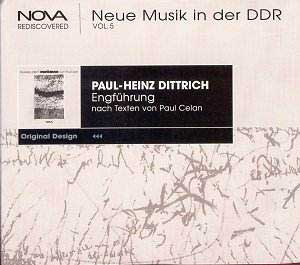Celanís parents, German Jews from Bukovina, died in
concentration camps. Celan was forced to live in exile, first in a labour
camp from which he escaped before finally ending up in Paris where he
took his own life in 1970. His often inaccessible poems were inevitably
influenced by his own experience during the Nazi era in Germany. As
Frank Schneider remarks in his excellent notes, poems such as Todesfuge
of 1945 and its companion Engführung of 1958 reflect the
atrocities suffered by the Jews in the hells of Nazi concentration camps.
Much the same could be said of most of Celanís verse that has attracted
much attention from several present-day composers. Wolfgang Rihm, Aribert
Reimann, Paul-Heinz Dittrich and Harrison Birtwistle, to name but a
few that come to mind, have set some of Celanís poems. Birtwistleís
Pulse Shadows and Dittrichís Engführung
are likely to be among the most substantial works inspired by Celanís
words.
Dittrich set parts of Engführung in his
Kammermusik IV (1977). This setting prompted him to consider
another setting, but the sheer size of the poem soon made it evident
that this would be on a large scale. A commission from the Südwestfunk
Orchestra gave him the opportunity to realise his project. Engführung
was composed in 1980 and first performed during the Donaueschingen Music
Days Festival in October 1981. Sigun von Osten was the soloist and the
performance was conducted by Matthias Bamert.
The work is scored for soprano, vocal ensemble (2 sopranos,
1 alto, 1 tenor and 2 basses), instrumental ensemble (violin, cello,
flute, clarinet, bass clarinet, guitar and piano), orchestra, tape and
live-electronics. This is undoubtedly an ambitious and substantial work
of some considerable complexity; and it would be idle on my part to
go into any details about it structure. Suffice it to say that Celanís
poem has some musical structure of its own (engführung means
stretto) with refrains and verbal variations that greatly help
maintaining some formal coherence to the whole. The work opens with
a prologue sung by the vocal ensemble on words restated later, either
literally or in variants, and concluding the poem, though not the work
as will be seen later. The various stanzas follow, interspersed with
orchestral interludes, most of which are quite short, though the third
interlude, occurring halfway in the work and signalling its climax,
is a rather weighty orchestral section. The whole setting alternates
according to the words and is set to full orchestral accompaniment or
to chamber-like ensembles. The vocal parts, generally set in a strongly
expressionistic manner, sometimes relies on speech and on pre-recorded
material. For the coda to the epilogue, Dittrich chose a late poem written
in 1967 commemorating the pre-Fascist murder of Rosa Luxemburg and Karl
Liebknecht heard mostly on tape and progressively silencing the singers
and the orchestra. As Schneider again aptly remarks, "what finally
comes into the picture is the continuity of active resistance against
any form of barbarism, not least against its least conspicuous but most
dangerous variant : indifference". Indeed, for all its complexity,
Dittrichís Engführung is a powerfully gripping work
of protest. No light stuff, though, but well worth the effort.
The present reading is quite simply marvellous. All
concerned obviously put all their heart in a work that clearly means
much to them, as it should to us. The 1988 recording still wears well.
Definitely, a major work of our time that is not likely to be heard
in concert very often, which makes this re-issue most welcome; and those
who have been similarly impressed by Birtwistleís Pulse Shadows
will certainly want to experience a totally different approach of Celanís
verse.
Hubert Culot


